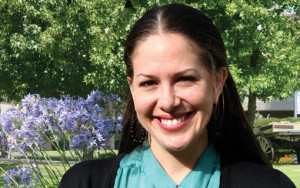 Alumnus Stephanie Pollaro, daughter of Norma Pollaro, presented a program on campus last November on Human Trafficking: ( Modern Day Slavery) that we thought our readers would find interesting. We are always happy to hear from our alumni.
Alumnus Stephanie Pollaro, daughter of Norma Pollaro, presented a program on campus last November on Human Trafficking: ( Modern Day Slavery) that we thought our readers would find interesting. We are always happy to hear from our alumni.
Stephanie informed the audience that Human Trafficking represents the third largest source of profit for organized crime, after drugs and guns, generating billions of dollars each year. Stephanie spent the last year in India, working with survivors of human trafficking. She is the founder of “International Sanctuary,” a non-profit organization working to bring hope to girls rescued from human trafficking and commercial sexual exploitation.
Wavelength asked Stephanie to tell us about her career path that eventually led her to form this organization.
After graduating from GWC in 1996, I transferred to Cal State Northridge, declared my major in Speech Communication and received a B.A. in Speech Communication. From there, I transferred to Cal State Long Beach where I received an M.S. in Counseling. After receiving my M.S., I stayed on and worked as a health profession advisor at Long Beach. This was a good choice for me, because I became very excited about being able to use my counseling skills.
It was during my stay at Long Beach that I learned about human trafficking. My eyes were opened to the world of slavery, especially in India. The more I researched the topic the more passionate I became. I took several trips to India and finally decided that I had to commit to the country, so I moved there for a year, working with a grass roots organization. I decided that the area I wanted to work with was the area of survivors of human trafficking. That is when I decided to start my own organization.
In my case, I work with the survivors who have been sexually exploited. The traffickers hold these girls and take them from their village or other countries, holding them as slaves to make a profit from rape. Today there are 27 million people enslaved and that is a conservative estimate. Sexual exploitation is the most common fate. Some are also held in bonded labor, agriculture and brick making. Some are held in domestic servitude. They are beaten, starved and don’t have any rights as human beings. It is estimated that of the 27 million held worldwide, 15 to 20 million are on the Indian Sub Continent.
The government of India is one of the few actually trying to do something about this epidemic. They could do much better, but they are dealing with a high level of corruption in government. Many government officials and police are tied into trafficking. It is an uphill battle trying to get convictions against traffickers, pimps and brothel owners. Some of the other countries still say it does not happen.
Tell us about International Sanctuary
We train rescued girls to make jewelry, which, in turn, we sell. We help them develop the skills that they possess to produce a product that is marketable in the US. By giving them a job skill we are able to show them an alternative to the life style they have been living. We work to restore their dignity and self worth.
Our organization is just two years old; we are not large at all. It took most of the first year to go through the long process of filing paper work to get our non-profit status. We started producing jewelry for sale about ten months ago. We work with fifty minor girls, ranging in age from thirteen to eighteen years old. My co-founder is Wendy Hicks, my mom, Norma Pollaro is on the board, and we have many volunteers that help in many ways.
We operate both in India and the United States. We work out of two homes in Bombay where we train the girls in the art of making jewelry. Our eventual goal is to open training centers in other countries.
Editor’s note: If you would like to know more about this organization, “International Sanctuary,” you can contact Stephanie at her e-mail address: spollaro@isanctuary.org Website: www.isanctuary.org

